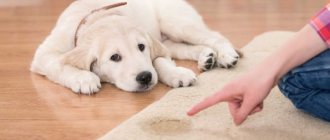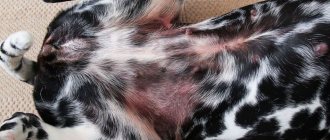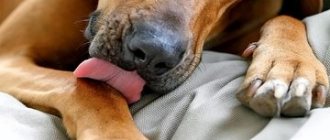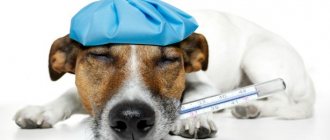Our Labrador Ares is in grief - his friend, the beagle Proshka, was taken away. As a result, the dog began to experience real depression: sad eyes, poor appetite, indifference to toys, treats and even girls (!). In general, everything is like a person’s, and maybe even worse. It turns out that depression in dogs is common and all breeds are susceptible to it, to a greater or lesser extent. Moreover, the higher the intelligence, the more the dog suffers. Faced with this problem, I began to look for ways to treat canine depression. I share the most useful information with you.
Causes of depression in dogs
What happened to our dog. The story began in May. The beagle, having been fairly well-fed and put on weight from the apartment grub, was given to us for the summer - either to the dacha, or to a correctional colony. He was placed with Ares - our pet has a huge enclosure in the garden and a large booth. The dogs spent half a day sorting things out, but having dotted all the “i”s, they became friends so much that they shared food and toys.
Summer was over, Proshka became slimmer and stronger, and they came for him... We felt that Ares would be bored, so we didn’t want to give up our friend. Whatever they came up with didn’t help - the beagle sold himself for a sausage and waved his paw from the car (((The loss of a friend for Ares turned into depression.
Causes of depression in all dogs. Any significant change in a dog's life can lead to depression. Anything can cause a disorder: moving, the arrival of a new family member or pet in the house, the departure of the owner, his frequent absences for work, the death or departure of other animals, and even undeserved punishment or a rude word!
Of course, the dog will have the strongest reaction to the loss of its owner or friend - a pet, because the loyalty of these pets is limitless. Scientists believe that depression is a response to the loss of attention that the dog received from its owner or friend. Dog breeders are sure that dogs feel and think just like people, and depression is sadness, sadness, sympathy and other completely human feelings. An example of this is postpartum depression in dogs; this condition occurs quite often in veterinary practice.
Depression in Dogs: Symptoms
Canine depression can be identified by the following signs:
- the usually energetic dog becomes lethargic and withdrawn;
- eats poorly;
- lies a lot, but may or may not sleep;
- refuses toys;
- shows no interest in things that usually make her happy.
If depression has become serious, the dog may refuse water and hide in dark places. Prolonged depression in a dog can result in the death of the animal, so it is necessary to remove the pet from this state by any means.
Increased physical activity
Hiking, walking, or running with your dog is a healthy and fun way to add daily healthy exercise to your busy schedule. Research shows that dog owners are much more likely to exercise. In addition, physical activity is very beneficial for the animals themselves. This will strengthen the connection between you, eliminate many problems in your pet’s behavior and preserve your health.
What we didn’t know about natural products: what time of day is it contraindicated to eat honey?
I store children's toys in a homemade pouf-chest: I made it from an ordinary box
Ruins of a Victorian town bath discovered in England under a car park
What veterinarians say about depression in dogs
This problem is often questioned by veterinarians. Dogs cannot talk about their feelings, and depressive behavior may not be the result of nervous feelings at all, but of another serious illness. Only dog owners can say for sure what caused the nervous disorder, and if it is obvious, we can talk about depression. There are no other methods to detect pathology yet.
Veterinarians recommend that at the first signs of depression in a dog, bring it to the clinic for an examination. The doctor should check for any medical problems causing the symptoms. It turns out that a dog is diagnosed with depression last of all.
Treatment of depression in dogs
It is important to address the problem before your dog becomes depressed. A depressive state can be successfully treated conservatively in the early stages; for chronic and severe depression, the disorder will have to be treated with medications that affect the nervous system.
Most dogs, if treated immediately and seriously, recover from depression within a few days, or at most a few months. Treatment of depression in a dog, first of all, involves the attention and affection of the owner, activities and games. You need to literally indulge your pet and keep him occupied, distracting him from sad thoughts. A great method is encouragement. As soon as you notice any manifestations of positive emotions, reinforce them with a treat. Pay attention to what your dog likes best. Our dog reacted brightly to walks, so we walked with him for any reason or without reason. But here it is important not to overdo it and monitor the dog’s behavior very carefully, because it’s quite easy to miss the moment of transition from the state “I feel bad, I’m depressed” to the state “I feel better, I’m taking advantage and I’m insolent.”
If your dog is depressed and moping because of the loss of a friend, you can get another pet.
Depression can result from hormonal changes. An example is postpartum depression in dogs and the autumn blues, when the days become shorter and the amount of the hormone serotonin produced by the brain decreases. In this case, treatment should be hormonal in nature.
Help for adults with Alzheimer's disease or dementia
People with Alzheimer's disease may have a variety of behavioral problems, most of which are directly related to their ability to cope with stress. Pets can be a source of nonverbal, positive communication. Gentle touch and playful interaction from a trained animal can calm a person and reduce aggression.
We could populate other planets with GMOs: scientists' opinion
Actor Bruce Willis kicked out of pharmacy for refusing to wear a mask
The first beauties of the USSR and modern actresses at 40: who looks younger (photo)
Depression Medications for Dogs
If all else fails, you will have to treat the dog with medications. To do this, you can use human drugs designed to relieve anxiety. The drugs Zoloft, Paxil, Prozac, Clomicalm are used abroad, while in our country their analogues are used. Antidepressant medications make dogs more relaxed, so the pet becomes more responsive to attention and games.
A drug course of treatment for depression will take from 2 to 12 months. It is dangerous to give people antidepressants for so long - they quickly get used to it and then cannot do without them. With dogs, everything is simpler - you can give the tablets as much as you need, and then just stop taking them. Even if habituation has occurred, your pet will not run to the pharmacy, therefore, as it is used to, it will wean itself.
How can you help an animal?
Treatment for depression depends on the animal's general well-being and the underlying cause. Usually the dog gets better after the stressor is removed. A change in the owner's behavior plays a beneficial role.
In severe cases, only medications can help a suffering dog.
What should the owner do?
The dog owner undertakes:
- provide her with complete peace;
- diversify your walks;
- regularly give your pet attention;
- feed correctly.
You should not “rape” your pet if he ignores toys and does not touch treats. When his body gets rest, he will resume his usual activities. It is advisable to allow the dog to communicate more often with its relatives. The exception is stray and “ownerless” animals.
Playing active games with your dogs can help your dog cope with depression.
The pet desperately needs communication not only with its own kind, but first of all with the owner. Regardless of how busy you are, you need to find a window in your schedule and regularly work with your dog - play with it, train it. It is important to remember the characteristics of the breed. Service dogs need serious exercise every day. Hunting breeds require outdoor activities.
Drug treatment
In severe cases, the dog is prescribed analogues:
- Klomikalma.
- Prozac.
- Paxila.
- Zoloft.
These medications help relieve anxiety. Thanks to antidepressants, the pet becomes more relaxed, sociable and affectionate. The duration of the medication course varies from 8 weeks to 1 year. As soon as your pet's condition improves, you can stop taking it.
Depression and chronic fatigue in dogs: a veterinarian’s opinion
It turns out that dogs can be depressed for no good reason; they become depressed out of the blue. And this happens quite often, and not only among our Russian pets. The problem has gone so far that one well-known behavioral psychologist (apparently from Israel) expressed the following thought on the Internet: “Today, the nervous system of dogs is increasingly overloaded, so they need to be given antidepressants.” The doctor explains that dogs accumulate stress and resentment just like people, they don’t forget anything. Over time, the nervous system becomes overloaded and fails. We didn’t think much about our pet’s nervous overload before. They fed, pampered and punished according to the case, but they did not worry about his “fine mental organization”. Now, having seen firsthand how our pet can suffer from depression, we realized.
Biologists say that the incidence of depression in dogs has increased in recent decades. This is due to a change in the pets' lifestyle. Previously, they were given more freedom, they communicated more often with other animals, because letting the dog out for a walk was considered the norm. Nowadays dogs are mostly walked on a short leash, or even wearing a strict collar. Walking time is limited and sometimes comes down to “going out to pee.”
The social circle of domestic dogs is becoming smaller and smaller, and it is becoming increasingly difficult for them to receive the attention of household members. It is not surprising that this becomes the cause of nervous overload, stress and, as a result, depression.
Another problem of nervous overload is the mismatch between the characters of dogs and owners. Often people choose a puppy breed based on its appearance, without thinking about its character. And it turns out that having got a companion dog, for example, a Dalmatian, they cannot pay him due attention. But such a dog is genetically designed to be a member of the family and the center of attention. It also happens the other way around - a family gets a fighting dog with a Nordic type of character, and constantly requires it to show emotions.
Reducing Anxiety
Spending time with your pet can provide comfort, build confidence, and help reduce stress. Since the lesser brothers do not think about what happened yesterday or what will happen in the future, they can help you, make you attentive and give you the opportunity to accept the joy of the present moment.
Words from Boris Grachevsky’s latest interview are worth everyone’s attention
Seaweed farms will produce natural livestock feed
The Russian Orthodox Church considers it inappropriate to dive into an ice hole for Epiphany
Preventing depression in dogs
It turns out that canine depression can be prevented, if, of course, you can foresee upcoming events.
- Moving . Do not transport your pet to a new place right away, first bring it several times to where you will live. Play with him there, walk around, feed him. Dogs very quickly get accustomed to new territory and enjoy spending time there.
- Death of a friend . If the second pet is sick and cannot be cured, bring another pet into the house. It's good if he has a cheerful, playful disposition. If your dog is not left alone after the death of a friend, his mood will rise faster.
- Change of owner . Alas, this happens in our lives. Start accustoming your dog to its new owner 2-3 months before departure. Walk and feed the dog together, play with him and gradually lengthen the time of communication.
- Autumn depression . Seasonal depression in dogs can also be prevented. Vitamins, strengthening agents, new toys, treats and fun games will help here.
The best prevention of depression in dogs is the love, affection and attention of the owner!
Alena Gerasimova (Dulles)











